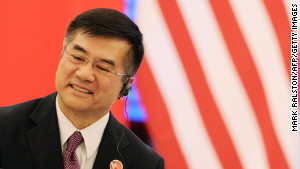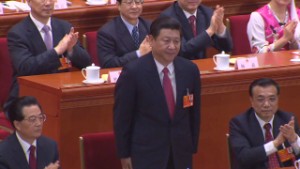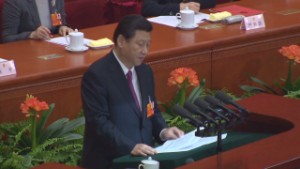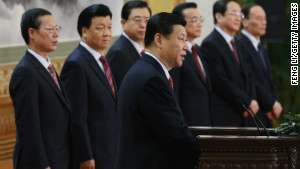How close can a foreigner get to understanding China?
In 1971 Jaime “Jimi” FlorCruz, a student leader from the Philippines, arrived in Beijing, eager to explore Mao’s China. But when President Ferdinand Marcos announced a crackdown on leftists, Mr FlorCruz found himself stranded. What began as a three-week visit turned into five decades of witnessing China’s transformation.
During his time in China, Mr FlorCruz became a well-known journalist, working as the Beijing bureau chief for Time magazine and CNN. In 2022, he was appointed the Philippines’ ambassador to China by President Ferdinand Marcos Jr., the son of the man whose regime had made it impossible for him to return in the 1970s.
On his last day at work, CNN Beijing bureau chief Jaime FlorCruzreflects on 43 years of covering China. Thank you, Jaime!http://cnn.it/1vF7LIT
December 31, 2014 -- Updated 0246 GMT (1046 HKT)
Editor's note: CNN Beijing bureau chief Jaime FlorCruz is the longest serving foreign correspondent in China; he's lived and worked in China since 1971. He studied history at Peking University (1977-81) and was TIME Magazine's Beijing correspondent and bureau chief (1982-2000). Jaime retires from CNN on December 31, 2014. As a tribute to Jaime, we've added some of his favorite stories to the sidebar of this piece.
(CNN) -- When Jaime FlorCruz, CNN's Beijing bureau chief, arrived in China on August 21, 1971, he says it was akin to visiting North Korea today.
The country was midway through the turmoil of Mao Zedong's Cultural Revolution. Universities and schools were just re-opening and students brandishing little red books toiled in factories or on farms.
FlorCruz, then a firebrand student leader from the Philippines on a study tour, found himself stuck in China after his name was placed on a blacklist by then Philippines President Ferdinand Marcos.
Fearing arrest as martial law was declared in his home country in September 1972, he stayed on along with four others from the study tour. A year later his passport expired, leaving him temporarily stateless.



"The idea was to come for three weeks and see what was going on," he says. "I'm an accidental tourist."
He ended up staying for more than four decades and launching a career as a journalist just as China began opening up to the world.
On his day of retirement from CNN, he reflects on his "ring side ticket" to China's rise:
What was life like under Mao?
When it became clear we were staying in China, we wanted to study but universities weren't ready to enroll foreign students, so we asked to work.
Our hosts didn't make us, but we insisted. I worked on a state farm in Hunan province. Initially, I found it a romantic idea but it didn't take long for the romance to wear off.
At the end of the day, we carved out two hours to learn Chinese. Our interpreter was our teacher and by the end of those few months on the farm I could converse in Chinese.
From late 1972, I worked on a fishing boat for two years. We'd go out on the high seas for five or six days at a time on two trawler ships pulling a huge net.
It was a spartan life, very simple.
It was sometimes bleak but often also exciting because of the political campaigns that were going on. We would only watch from the sidelines -- see posters and in private discussions with Chinese friends. We were told not to get involved.
Tell us about some of your memories of university and your circle of classmates.
I was in the class of 1977 -- the first class when college students were enrolled through a nationwide entrance examination. Among my cohorts was current Premier Li Keqiang; he studied law.
Also among them was Bo Xilai, once one of the most powerful politicians in China, now disgraced and sentenced to life in prison for corruption and abuse of power. He was in my world history class. We would stand in the cafeteria holding our bowls of food -- there were no chairs to sit on -- and he dared to come close to foreign students like me.
He knew enough English to chat with me and even then was quite charismatic and opinionated.
A lot of that batch of fellow students are now in important roles in the government bureaucracy. Some are top professors, scientists and entrepreneurs. I've kept friends with many of them. They've been good sounding boards.
You've witnessed the trial of the Gang of Four, the Tiananmen Massacre and the Olympics. What else stands out?
I covered Wham's concert, the first Western pop group to perform in China. It was attended by thousands of Beijing residents, most of whom just looked perplexed. Police looked on sternly if anyone stood up to cheer and dance.
I remember when Coca Cola went on sale for the first time -- people thought it tasted like a Chinese medicine concoction.
Later on, it was a big treat to interview Yao Ming when he chosen as the number one NBA draft. I'm a huge basketball fan and Yao turned out to be a humble and affable guy although I got a sore neck.



When I was at TIME, my big scoop was breaking the news of Jiang Qing's (Mao's widow who went on trial as part of the Gang of Four) suicide several days before it was reported by Xinhua.
But to be honest scoops like that were rare and perhaps less important than providing accurate and fair reports and analysis day after day, week after week.
You're the longest-serving foreign correspondent in China. How has covering the country changed?
It's easier than it used to be in the 1980s.
There was a then 10-day rule that required us to give notice if we wanted to leave Beijing. Technically, except for Tibet, we can now go anywhere as long as someone invited us.
In recent years though, there have been signs of tightening. Many colleagues, including our own crew, have had brushes with authorities -- the hand in front of the camera.
CNN comes under heavy scrutiny because it's so closely associated with the United States and we have been accused of biased reporting on China. I've had to explain to officials here that we're not an extension of U.S. government; we are independent. We report it as we see it.
China is a much wealthier place than when you first arrived. Have all the changes you've seen since the 1970s been for the better?
I echo what my Chinese friends would say.
They enjoy much more personal freedom -- the freedom to travel, to choose where to live, to marry whoever they wish, to take a job or quit a job. Freedom of speech and expression has it limits but most people know where the red line lies.
Of course, there are problems. Many are the unintended consequences of the reform that started 30 years ago like environmental pollution and degradation -- and the lack of a spiritual anchor for most Chinese.
I see a nation of 1.3 billion seemingly rudderless, looking for direction and meaning in their lives, even those who are rich. It's not a big secret. I think the government acknowledges this crisis of faith.
You've lived in China for 40 years and raised a family here. How do you feel about it?
I've lived here 43 years, I've seen where it came from. I appreciate all the quotidian changes. I tend to look at China as a glass half full rather than half empty because I've seen it virtually empty.
It was my refuge and later my training and battle ground as journalist.
I feel bittersweet to be ending my time here as a foreign correspondent. It's been a rewarding experience and not really the end. I'll still be involved in China watching, in China, or wherever my next projects and adventures take me.
In the next few months, my wife Ana and I will stay on in Beijing, where she is gainfully employed. For a change, I will be the "trailing spouse" but later I hope to do a bit of writing and speechifying.
Should you leave China, what will you miss about it?
China's been my second home, although it will never replace the Philippines as my homeland.
I'll definitely not miss the Beijing smog, but will certainly miss the quaint, old neighborhood nearby, including the men who belt out visceral shouts early in the morning, their way of exercise, my wake-up call. I'll miss the guttural accent of the Beijing taxi drivers and their unsolicited opinions. I'll miss the food --jianbing, zhajiangmian, Peking duck -- and, yes, my periodic foot massage.
Of course, I'll miss my friends, who've accepted me as a virtual Beijing Ren (Beijinger).
What's your advice for journalists in China?
The best stories are often of ordinary people doing extraordinary deeds. Keep up the good fight for fair, honest and nuanced reporting.
China has changed dramatically. I feel fortunate to have been in the right place at the right time to have witnessed these changes up close.
For better or worse, China now is a major player in the world. I never imagined China could be so prosperous, powerful and proud. Whatever China does, or does not do, has impact on global affairs and our lives. For our sake, and China's too, I hope China will emerge as a peace-loving global power.
CNN's Katie Hunt in Hong Kong contributed to this report
離譜 賄選逃亡 竟可參選議員 / 蔡錦賢逃至中國七年 躲過行刑權時效後返國
2014-12-30
〔記者王文萱、鍾麗華、何玉華/綜合報導〕立法院民進黨團昨指控,新北市議員蔡錦賢曾在一九九八年因違反選罷法的「預備行賄罪」,遭判刑七個月、褫奪公權兩年定讞,但蔡潛逃至中國,待「行刑權時效」過後才返國,參選首屆新北市議員,中選會竟然同意他參選,結果這次再度順利連任。在野立委譏諷這根本是鼓勵政治人物遭判刑確定後,先逃亡再說。
民進黨立委吳秉叡還質疑,蔡所屬選區的國民黨立委吳育昇居中扮演關說角色,「為何國民黨執政就可沆瀣一氣讓這種人參選?」但吳對此否認,指這件事根本與他無關,他未曾關心過此事;且蔡是自行要求中選會解釋,若民進黨團再隨便指控,他將提告。
蔡:請示過中選會意見
蔡錦賢回應說,立委認為有問題應該去找中選會,他當初要參選,請示過中選會的意見,是中選會說可以選才選,不是他要選就能選。
蔡說,若真有問題,參選第一屆新北市議員時,就可以對他提告了,為什麼要等到第二屆當選了,先對他提當選無效之訴,民進黨團又開記者會說他當選無效,「簡直是侮辱」,他要立委查清楚再開記者會,將與律師討論,不排除採取法律動作。
針對蔡錦賢先潛逃中國再返台當選議員的誇張案例,中選會法政處長賴錦珖表示,中選會曾就蔡錦賢案詢問法務部,以釐清是否符合選罷法第廿六條第四款,即遭判處有期徒刑以上之刑確定,尚未執行或執行未畢,不得登記為候選人,但法務部明確表示不適用,認為蔡的情況是執行時效喪失,沒辦法執行刑罰。
法部認蔡是執行時效喪失
吳秉叡指出,依現行選罷法規定,若蔡錦賢未入監服刑完畢就不能參選,但中選會函釋卻讓蔡鑽漏洞,指蔡是因超過行刑權時效,與執行完畢、未執行不同,「仍得登記為候選人」,根本是鼓勵政治人物被判刑後逃亡,只要逃亡到行刑權失效後就可以參選。
律師顧立雄也質疑,選罷法規定受過有期徒刑宣告者,一定要執行完畢才可以參選,但蔡錦賢「跑到中國逍遙,沒有因為這個案子入獄過一天,這樣算不算執行完畢?」即使蔡錦賢違反「預備行賄罪」,與終身不得參選的「行賄罪」不同,但顧立雄強調,兩者本質上都是一樣的罪,加上蔡「一直逃一直逃」,也從未起算「褫奪公權」的時間。
民進黨立委段宜康痛斥此案「離譜至極」,竟有人買票判刑確定後,還可逃亡七年回來繼續參選,「中選會要出來給個交代,致使無效的選舉結果必須被重新檢驗」。他更挖苦說,乾脆訂個法律,犯罪判刑確定後,開放三天逃亡期,「只要三天內跑掉就沒事」。

沒有留言:
張貼留言